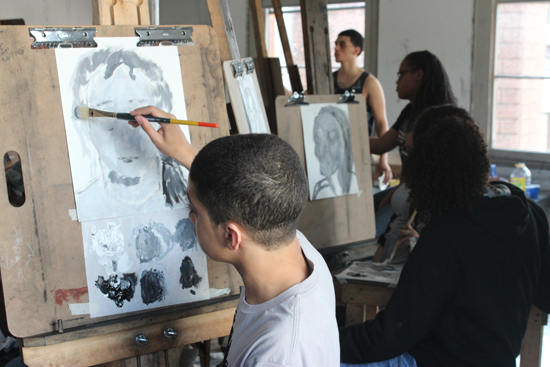"My daughter is a freshman at art school this year. She has chosen painting as her major. How does an artist in a classical medium like painting choose electives that will make them relevant in a digital world? What types of courses should she choose to make herself more marketable? What types of internships help guide a successful career for a painter in a high tech world?"
To be relevant as an artist today, your daughter will first need to achieve an awareness and comprehension of the contemporary art world. If she can take art history courses that focus on contemporary art, this will be highly influential to her development as an artist. In art school, I didn't take the initiative to study contemporary art. At the time, I dismissed all contemporary art based on just a few pieces I disliked. I was very ignorant, and I didn't take the time to thoughtfully study and seek out contemporary art I liked. The consequence was that it took me many years after graduation to develop a sense of the contemporary art world. When I started working professionally, I quickly realized how important it was to not work in a vacuum. To create a context for my artwork, I had to acknowledge and understand the art being produced today, regardless of whether I liked it or not.
The digital world we live in has created a common misconception that incorporating digital media into your artwork is imperative to be relevant as an artist today. Actually, there are many contemporary artists out there working in traditional, hands-on processes who are very successful. Taking courses that teach specific software is only important if these techniques are integral to the making of the artwork. The one exception might be Photoshop, which is necessary for producing high quality images of artwork. One of my colleagues used to say that as artists, "we live and die by our photographs." The majority of the time, one's artwork is not seen in person and the importance of having strong photographic documentation of the artwork is absolutely essential.
The area where digital media is crucial is in the marketing of the artwork. In my opinion, these are skills that can be primarily addressed after art school is over. Most art schools don't offer courses on marketing, and even if they did, each artist's path is so artist-specific that a marketing plan really has to be custom tailored to their needs. While she is still in art school, it would be best for your daughter to choose courses that she has a genuine interest in, and that will contribute to her studio practice. Some students invest too much energy worrying about the future, to the point that they compromise their art school experience by enrolling in electives that they dislike, but that they think will help them professionally. For example, a lot of students think that it's necessary to take a web design course in order to prepare for the professional world. On the contrary, there are numerous options today for making a website that don't require any previous expertise. For an artist who simply wants to have their own website, learning how to build a website from scratch is just not mandatory anymore.
In the fine arts, the options for internships would be to work at a gallery or museum, or to work as an assistant for a professional artist. Being in a gallery or museum context would provide a glimpse into how these venues function, as well as an understanding of the details in the process that are frequently not discussed at art school. One of my students who interned at a museum said she couldn't believe how much work went into simply framing and handling the artwork, as well as the complexities of the relationships between the artist and the museum staff. By experiencing this first hand, the student became fully aware of what is required of an artist in terms of preparing the artwork for a professional exhibition. Research the galleries and museums that you are considering, find out what kind of programming they offer, and what types of artists they have shown in the past. Depending on the mission of the organization, the experience at the internship will vary tremendously. A mainstream commercial gallery operates very differently than a small regional museum.
Getting a position working with a professional artist is much more elusive. These positions usually are not advertised and are found through personal connections. Additionally, the professional artist has to produce a high enough volume of work that they need assistants and also have the financial resources to support an internship. I actually don't recommend this route; many of my former students and peers have worked as assistants for professional artists and the majority of them ended up doing mindless labor for very little money. One of my peers from graduate school worked at Jeff Koons' studio after graduating and he found the experience demoralizing and extremely dull. I once visited him at the studio, and it was literally room after room of art school graduates toiling away at tedious tasks that had been assigned to them.
While taking these combined initiatives will contribute to your daughter's preparation for the professional world, these concerns should largely stay on the back-burner until graduation. The principal responsibility she should have in art school is to savor this opportunity to concentrate solely on the creation of her art within the context of a vibrant artistic community.
Ask the Art Professor is an advice column for visual artists. Submit your questions to clara(at)claralieu.com

